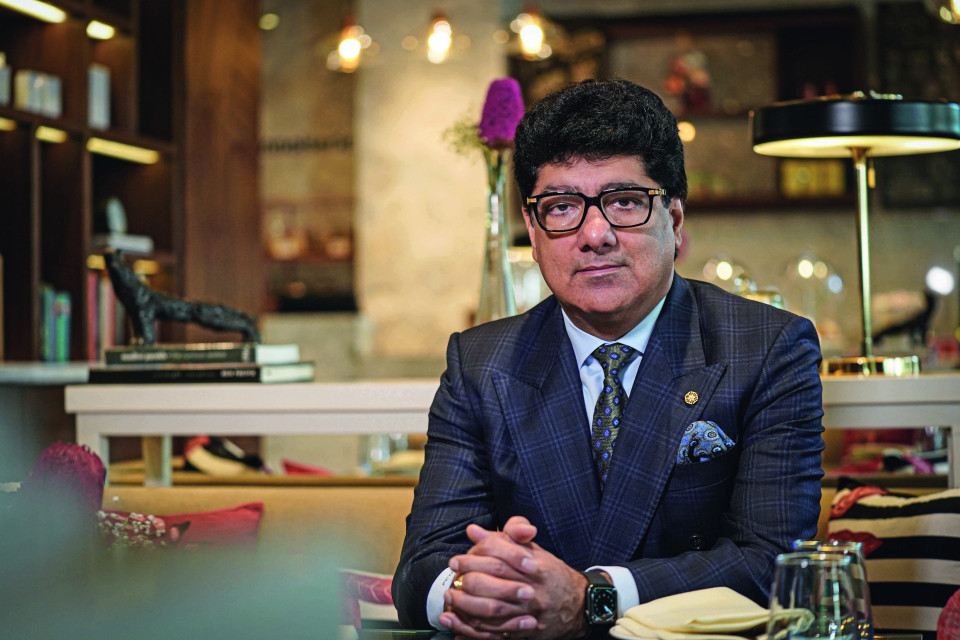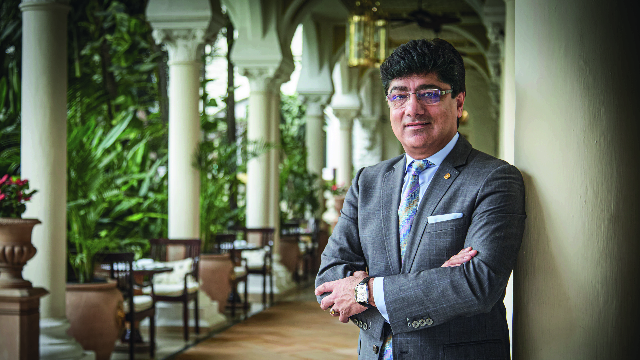Reflets Mag #153 | Puneet Chhatwal (IMHI 91), MD & CEO at IHCL: “Whatever You Do, Do It With Integrity”
Puneet Chhatwal (IMHI 91) has been Managing Director and Chief Executive Officer of Indian Hotels Company Limited (IHCL), the leading Indian hospitality company part of the Tata Group, since 2017. On the cover of Reflets Magazine #153, he reflects on his career with several major international hotel groups and on his current role at the helm of over 300 hotels, breaking financial records for eight consecutive quarters. He is also Honorary Chairman of ESSEC Alumni’s India Chapter. Here is a free preview of his interview… Subscribe to get the next issues (in French)!
Reflets Magazine: What was your career path before you arrived at the helm of IHCL almost seven years ago?
Puneet Chhatwal: I spent the first 25 years of my life here in India, where I joined the University of Delhi after school to do a degree in Hotel and Restaurant Management. After a few years with the India Tourism Development Corporation, I went to Paris in the late 1980s to study for two years at ESSEC’s IMHI programme, which had been set up a decade earlier in partnership with Cornell University’s School of Hotel Administration in New York (Cornell Nolan School, ed.). After graduating, I joined FEURING GROUP based in Mainz, Germany, where I stayed for just over six years before joining Carlson Hotels Worldwide, which later became Carlson Rezidor Hotel Group, as their Chief Development Officer. I then took over as member of the Management Board of Steigenberger Hotels AG in 2012, before returning to India five years later.
RM: Why did you decide to return to India after so many years in Europe?
P. Chhatwal: For at least three reasons, first of all personal and family reasons. My mother, who was alone in India at the time, was in her 80s and not in the best of health. My sister lived in the UK and I lived in Germany, and at that time we couldn’t seriously consider bringing her to Europe – it wouldn’t have been practical. And then, over the years, I’d done a lot of work for American and German hospitality brands, I’d learned a lot about the resilience of the Germans, their discipline and attention to detail, and I thought maybe now was the opportunity to apply all that to a brand in my own country. I had already received an informal offer from the Taj Hotels Group in 2013, which I turned down at the time. I can’t hide the fact that a little later I said to myself that this was the biggest professional mistake of my life, that this offer would never come again. The offer came back four years later, in 2017, and my wife encouraged me to take things more seriously this time, that it was an incredible opportunity, especially as IHCL is a ven erat ed institution and Taj, its iconic brand has a rich legacy of over a century. Taj is the oldest brand in the Tata Group, which is celebrating its 120th anniversary this year. We say here that it is the jewel in India’s crown and that if you serve Taj, you serve the country. The Tata Group is distinguished by its leadership, its values, its standards.
RM: Could you tell us about the Indian Hotels Company Limited group?
P. Chhatwal: IHCL was founded in 1899 by the founder of the Tata Group, Mr Jamsetji Tata, and opened its first hotel in Bombay (now Mumbai), the Taj Mahal Palace, at the very beginning of the 20th century. Today, it is a hospitality ecosystem with many brands, of which the Taj is the flagship. Our culture is defined by three core values that are common to all these brands. The T in Taj symbolises the trust that exists in all our units, the A stands for the awareness of the communities in which we live and the environment in which we operate, and finally the J stands for the joy of in everything we do. These are characteristics shared by all of IHCL’s brands. Thus, IHCL is a group that manages a portfolio of hotels, resorts, palaces, spas, safaris and premium food and beverage services. Taj, Seleqtions, Vivanta, Ginger, Amà stays & trails, Qmin and many more are premium brands in the segments they operate in and most of these have attained scale in the past few years. Our strategy is to extend these brands throughout the Indian subcontinent, whether in Sri Lanka, Nepal or Bangladesh and Taj our iconic brand will travel across borders given its global standing. We currently have 220 hotels in operation, with a market capitalization of almost $10 billion, depend ing on the exchange rate between the dol lar and the rupee. This is the highest market capital iza tion per room in the world.
RM: What are the challenges you are facing today?
P. Chhatwal: First of all, there are geopolitical challenges such as the war between Russia and Ukraine and the situation in West Asia, which are not good for the tourism sector. Today, the number of foreign tourists in India is at an all-time low. The second challenge is growth. We can’t build as fast as in the Western world, and it takes a long time to secure multiple pre and post construction approv als here, which slows us down a lot in our quest for development. Finally, the third challenge is gener ational. The average seniority of our managers is more than 25 years with the group, which is an undeniable advantage because they know the Taj by heart, it is in their DNA and they are totally loy al. On the other hand, it’s a double-edged sword for us. We have a saying back home that making an elephant dance and sing is very tiring. What I mean by that is that it’s hard to explain to them that we can work differently to be even better, because a lot of them wonder why we should change when we’re so successful.
RM: How has the IHCL Group evolved in recent years?
P. Chhatwal: As a leadership team we have focused on rebalancing the culture and strategy of the company. So, every three months we have a big meeting on strategy, then one on culture and so on. On the culture side, we work a lot on behavioral issues, psychology, flexibility, resilience and innovation. As far as strategy is concerned, we work on the actual strat egy, how to achieve it, which we communicate to the market because we are a listed company. We have also worked hard on communications, taking the company’s communications, both internally and externally, to an unprecedented level. This was particularly true during the Covid crisis, during which we communicated extensively with all employees, giving us the opportunity to set up a Tajness Day, a whole day dedicated to employees and their families, a sort of celebration in honour of the people who served the frontline workers during the health crisis, and also, sadly, a celebration in honour of those of our employees who lost their lives. My motto is something like "customers first, people always".
RM: What is your management style?
P. Chhatwal: [read the full article in Reflets ESSEC Magazine #153]

Interview by François de Guillebon, Chief Editor at Reflets Magazine
From Reflets ESSEC Magazine #153. Read a preview. Subscribe to get next issues (in French).

Commentaires0
Veuillez vous connecter pour lire ou ajouter un commentaire
Articles suggérés



